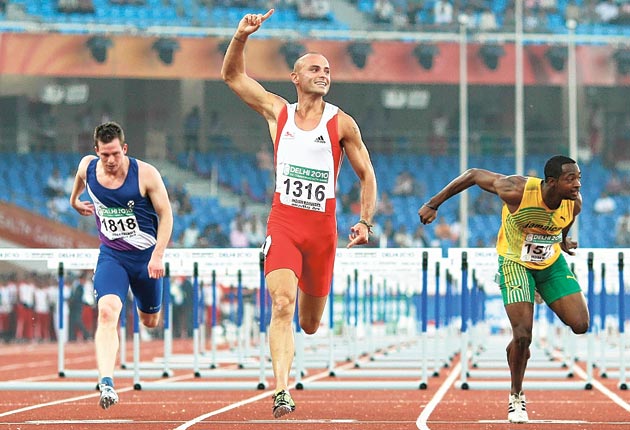Easy as 1-2-3: England's record high in hurdles

Your support helps us to tell the story
From reproductive rights to climate change to Big Tech, The Independent is on the ground when the story is developing. Whether it's investigating the financials of Elon Musk's pro-Trump PAC or producing our latest documentary, 'The A Word', which shines a light on the American women fighting for reproductive rights, we know how important it is to parse out the facts from the messaging.
At such a critical moment in US history, we need reporters on the ground. Your donation allows us to keep sending journalists to speak to both sides of the story.
The Independent is trusted by Americans across the entire political spectrum. And unlike many other quality news outlets, we choose not to lock Americans out of our reporting and analysis with paywalls. We believe quality journalism should be available to everyone, paid for by those who can afford it.
Your support makes all the difference.The first time the men's high hurdles title was on the line at a Commonwealth Games it was won by a member of the English aristocracy. That was in Hamilton, Canada, in 1930, when Lord Burghley emerged victorious from the 120 yards hurdles.
The winner of yesterday's 110m hurdles crown – Andy Turner, who led an English 1-2-3 – is no aristocrat but the man who came third has bluer blood. Lawrence Clarke is an heir to a baronetcy and the eldest son of Sir Toby Clarke (and nephew of Jacob Rees-Mogg, the Tory MP for North Somerset) was more than happy to snatch the bronze and complete England's first clean sweep of the medals in any sport at these XIX Commonwealth Games.
While the rising young star lunged across the line to pinch third place from Eric Keddo of Jamaica by 0.01sec, clocking 13.70sec, and William Sharman took silver in 13.50sec, it was Turner who claimed the victory. He is now a double title winner, having followed Colin Jackson as only the second 110m hurdler to bag Commonwealth and European gold in the same year. "I had a dream of doing the double, so I'm chuffed to bits," he said.
Clarke, winner of the European junior title last year, could hardly have been more pleased. "I'm so happy we've got an England 1-2-3," the 20-year-old said. "It's the best day of my life.
"I didn't think I had a chance of a medal when I tore my hip flexor [the muscle that lifts the knee] in the warm-up for the heats this morning. I didn't even risk a warm-up for the final tonight. I just trusted in my training and it came together."
It transpired that Sharman had also been suffering. "As soon as I finished the heats this morning I was taken to hospital and I've been on a drip all afternoon," he revealed. "I've had terrible stomach cramps and I've been coughing my lungs up. The only reason I ran in the final was because my mum flew over here to watch me."
The fact that Turner had to beat one team-mate who had been on a drip and another too fragile to warm up did little to dispel the impression that many of the track and field golds in Delhi do not exactly have a 24-carat sparkle to them. Still, there was nothing second class about the women's 1500m final, won in a Games record 4min 5.26sec by Olympic champion Nancy Langat of Kenya. Scotland's Steph Twell took bronze.
In the hammer England's Alex Smith was denied the title his father, Dave, won in Edinburgh in 1986. The lifetime best 72.95m he threw in the second round was trumped by a 73.15m effort from South Africa's Christiaan Harmse.
Join our commenting forum
Join thought-provoking conversations, follow other Independent readers and see their replies
Comments